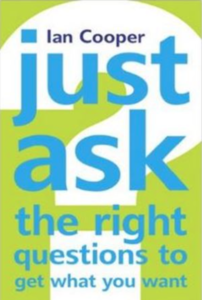Back in May of 2019, I wrote a post about asking questions before making assumptions. If you aren't a long-time CaritaGardiner.com/blog reader, I recommend you go back to read that post before you read this one. At the time, I was thinking about two moments in which I unintentionally did things that violated others' senses of decorum. In both cases, I could have asked what was going on or the person berating me could have asked if I understood the situation as they saw it. Questions (rather than statements) would have smoothed both interactions.
This year, I've had a reason to think about more advantages of asking questions. I have a new advisee this year. She's an amazing young woman from Kenya. (Hi, EC!) Because she's the first international advisee I've had, getting her started up this year was an introduction for me in getting to witness what a great job our Director of International Programs (Hi, DLT!) does when he helps facilitate the many issues inherent in starting at a new school in a different country, this one.
One of the pieces of advice I heard him give to her was about asking questions when she needed something. He advised, "If you're shy about asking for what you want, you can always pose what you need as a question, such as, 'Would it be helpful if I had some X?'" The recommendation got me thinking about when people ask questions.
I came up with three scenarios in which people question others. I'll write about all three.
- When they want to know the answer:
The first category of questions is pretty straightforward. It's sometimes scary to ask what we don't know, but it's always helpful. If I don't know where something is, how to do a necessary task, who's in charge, etc, I can always ask someone who has more information than I do. As long as I ask a person in the know and phrase my question in a way that makes sense, I'll learn the information I need and can go on with my life better informed than I was before.
- When they need something:
This is the kind of question my peer was advising. To help my advisee feel less demanding but to allow her to get what she needed, he advised posing a want/need as a question. I love the idea that by interacting this way, the person helping earns a bigger reward in not only knowing how to help, but also in figuring out that the help is the best answer to solving a problem. Asking a question is a gentle way to alert someone else to a problem/issue that they might not have considered.
- When they know or think they know the answer, but want to make the other person say it:
This kind of question seems the most complicated to me. I know that starting journalists sometimes get the advice never to ask questions they don't know the answer to, but when we're not being recorded, this type of questions can come off as (or really be) manipulative. As I teacher, I try not to play the "Guess what I'm thinking" game, a common tactic identified for me by one of my all-time favorite teachers. (Hi, JN!) More than just in the classroom, asking when we already know or believe we know can be a passive aggressive act, which I'd recommend avoiding.
Overall, I'm left thinking that asking questions is often a beneficial approach to life. Have I missed another reason people ask questions? Do you agree with this assertion? What else should people consider as they ask questions? Are you willing to share your responses in the comments? (See what I'm doing here?)

To try to determinee the extent to which the other person understands what was just said, or understands any specific thing However “Do you understand?” answered “Yes” is unreliable.
Yes, that goes with, “Are we both thinking about the same thing?” answered “yes” is also unreliable. In fact, in movies and television shows, it’s reliably wrong.
While I agree with everything above, I was actually just thinking about times we shouldn’t ask questions. The interaction that got me thinking about it was seeing a friend I hadn’t seen since her now-teenage kids were babies. She asked them some variation on, “You remember Viveca, don’t you?” Why put the kids on the spot that way? And if it does happen, I suggest that it’s fine to respond without answering the question. Just say “how nice to see you” instead of “yes,” “no,” or “nice to meet you,” any of which feel like potential traps!
But better to avoid the question altogether. She could have given the kid the same info without requiring a response: “You’ve met Viveca before, but it was a long time ago.”
I also just learned how you’re supposed to diffuse difficult situations by labeling someone else’s emotion without asking about it, but I hate it when people label my emotions, so I’m not sure I can follow that advice.
If I know my sister, I sense a future Why Wednesday on Why Not to Ask Questions!
I totally agree with your first paragraph and have an addition to your suggestion for what she could/should have said. How about, “You’ve met Viveca before, but it was a long time ago at the Z. When you met, you were doing X” or “she said Y and you laughed so hard,” etc. That way, they might get a reminder about earlier encounter. It’s funny that it hadn’t yet occurred to me to write this post’s opposite. But I have a better idea than that; I’m thinking I should probably put up a guest post by my sister called Why Not to Ask Questions! (hint-hint-nudge-nudge)